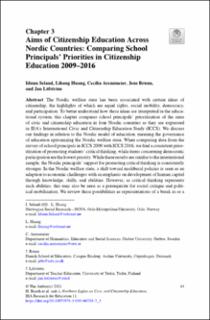| dc.contributor.author | Seland, Idunn | |
| dc.contributor.author | Huang, Lihong | |
| dc.contributor.author | Arensmeier, Cecilia | |
| dc.contributor.author | Bruun, Jens | |
| dc.contributor.author | Löfström, Jan | |
| dc.coverage.spatial | Norden | en_US |
| dc.date.accessioned | 2022-01-20T14:51:29Z | |
| dc.date.available | 2022-01-20T14:51:29Z | |
| dc.date.created | 2021-03-03T15:17:35Z | |
| dc.date.issued | 2021-02-27 | |
| dc.identifier.isbn | 978-3-030-66788-7 | |
| dc.identifier.isbn | 978-3-030-66787-0 | |
| dc.identifier.uri | https://hdl.handle.net/11250/2838544 | |
| dc.description.abstract | The Nordic welfare state has been associated with certain ideas of citizenship, the highlights of which are equal rights, social mobility, democracy, and participation. To better understand how these ideas are interpreted in the educational system, this chapter compares school principals’ prioritization of the aims of civic and citizenship education in four Nordic countries as they are expressed in IEA’s International Civic and Citizenship Education Study (ICCS). We discuss our findings in relation to the Nordic model of education, meaning the governance of education epitomizing the Nordic welfare state. When comparing data from the survey of school principals in ICCS 2009 with ICCS 2016, we find a consistent prioritization of promoting students’ critical thinking, while items concerning democratic participation are the lowest priority.While these results are similar to the international sample, the Nordic principals’ support for promoting critical thinking is consistently stronger. In the Nordic welfare state, a shift toward neoliberal policies is seen as an adaption to economic challenges with an emphasis on development of human capital through knowledge, skills, and abilities. However, as critical thinking represents such abilities, this may also be seen as a prerequisite for social critique and political mobilization. We review these possibilities as representations of a break in or a continuation of the traditional ideas of citizenship associated with the Nordic welfare state. We conclude that, for Nordic principals, critical thinking may align with the recent international emphasis on competence while also relating to the concept of Bildung, an 18th-century emancipation ideal with deep roots in the Nordic model of education. | en_US |
| dc.language.iso | eng | en_US |
| dc.publisher | Springer | en_US |
| dc.relation.ispartof | Northern Lights on Civic and Citizenship Education: A Cross-national Comparison of Nordic Data from ICCS | |
| dc.relation.ispartofseries | IEA Research for Education;Volume 11 | |
| dc.relation.uri | https://link.springer.com/chapter/10.1007%2F978-3-030-66788-7_3 | |
| dc.rights | Navngivelse 4.0 Internasjonal | * |
| dc.rights.uri | http://creativecommons.org/licenses/by/4.0/deed.no | * |
| dc.subject | Civic education | en_US |
| dc.subject | Citizenship education | en_US |
| dc.subject | International Civic and Citizenship Education Study | en_US |
| dc.subject | Nordic model | en_US |
| dc.subject | Welfare states | en_US |
| dc.subject | Critical thinking | en_US |
| dc.subject | Democratic participation | en_US |
| dc.title | Aims of citizenship education across Nordic countries: Comparing school principals' priorities in citizenship education 2009-2016 | en_US |
| dc.type | Chapter | en_US |
| dc.type | Peer reviewed | en_US |
| dc.description.version | publishedVersion | en_US |
| dc.rights.holder | © The Author(s) 2021 | en_US |
| cristin.ispublished | true | |
| cristin.fulltext | original | |
| cristin.fulltext | original | |
| cristin.qualitycode | 1 | |
| dc.identifier.doi | https://doi.org/10.1007/978-3-030-66788-7_3 | |
| dc.identifier.cristin | 1895389 | |
| dc.source.journal | IEA Research for Education | en_US |
| dc.source.volume | 11 | en_US |
| dc.source.pagenumber | 43-63 | en_US |
| dc.subject.nsi | VDP::Andre pedagogiske fag: 289 | en_US |
| dc.subject.nsi | VDP::Other subjects within education: 289 | en_US |

